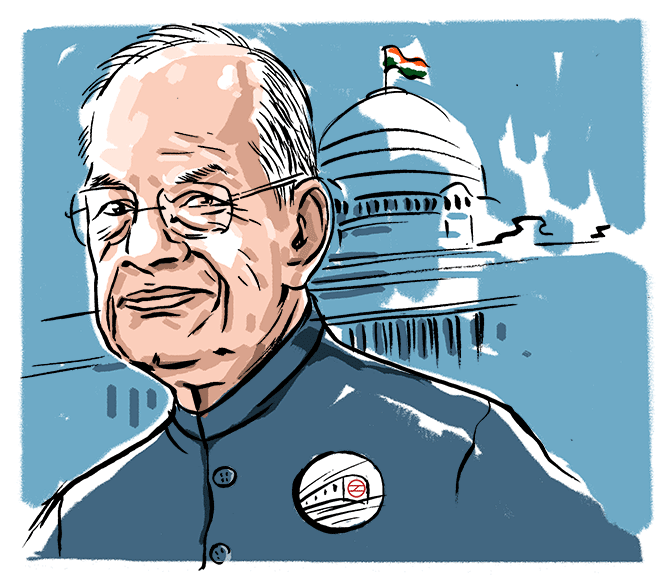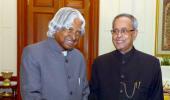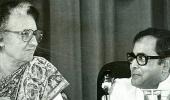'Sreedharan epitomises the way in which an Indic ethos can be brought to bear upon the seemingly intractable problems facing India,' says Rajeev Srinivasan.
Illustration: Dominic Xavier/Rediff.com

Ten years ago, I wrote about the then Presidential election in India, bemoaning the fact that A P J Abdul Kalam, eminently qualified to continue, had been pushed aside by the Congress.
Now that we are in the throes of another election, it's worth revisiting the entire drama, from first principles.
To begin with, what is the function of the President in India?
Apart from the fact that you get to live in an enormous palace and enjoy the 300 acre or so estate in the middle of New Delhi, exactly what does the President do?
Travel the world with an entourage, meet with other heads of government, receive and give gifts? Seems like a great sinecure to me, with no particular outcome, and lots of leisure.
Cushy sinecure. That's probably why all parties like to lobby for one of their own to be put into the job.
One way to reward loyalty. Or a way to shut up someone who knows too much about your party's indiscretions, and benefit greatly from taxpayer largesse.
Another reason would be to kick upstairs a troublesome person.
In the President's job, you cannot do much damage. That's why I wish India had had the good sense to shove Jawaharlal Nehru into that role, instead of letting him run amok as executive prime minister. Untold damage, as I suggested many years ago.
But seriously, why is there an office of President?
It appears somewhat like the office of the VP in the US: Ceremonial, with little substance. The US VP is supposed to take over in case the US President dies.
In India, the equivalent would be the President's role in helping select a new prime minister. But an alternative power centre the Presidency is not, as was demonstrated by Fakhruddin Ali Ahmed during the Emergency (Abu Abraham's memorable cartoon in the Indian Express lampooned the then President as signing orders in his bathtub).
If there has to be a ceremonial President, it should be mandated that it must be a non-politician, but a person of substance.
Of all past Presidents, only two stand out: Sarvepalli Radhakrishnan and A P J Abdul Kalam. One, a philosopher and man of letters. Two, an accomplished engineer.
Yes, the kind of person that a child can be inspired by and look up to, a role model.
Consider the others: Not many of them have shown excellence in anything. One former President was said to be a personal retainer to the Nehru dynasty, with no other claim to fame. Others were utter nobodies, gray eminences who were utterly forgettable, and are deservedly forgotten.
But a man of letters inspires. When I wrote earlier, I mentioned that O V Vijayan, the brilliant novelist and cartoonist -- for my money he was the greatest 20th century writer in India -- would be the kind of person I would be proud to say is the President of India.
He was a Nobel-class fabulist, like Gunter Grass and Gabriel Garcia Marquez. Of course, he was never in consideration, as politicians monopolsze the Presidency, and he would anyway have been blackballed by his former Leftie pals.
I once mentioned Shashi Tharoor, a silver-tongued orator and outstanding writer, as a potential Presidential candidate. Based strictly on his writing, I'd still vote for Tharoor.
However, he has other baggage: He is a politician, forced to compromise based on political survival in the party of the Dynasty. Besides, he has other problems too.
But you see what I mean: An Octavio Paz, or a Haruki Murakami, or an S L Bhyrappa or a Margaret Atwood. People whose words ring true.
The other choice is people who have been professional successes in their spheres of endeavour. A brilliant engineer like M Vishvesaraya. I wrote in 2007 about the tycoons of software services, but they turned out to have feet of clay, as they stood by and watched the eclipse of their business model by insurgents.
Maybe an economist like Jagdish Bhagwati, but then people will push forward Amartya Sen, and economists on average seldom can predict anything, despite being keen how to explain how things happened post facto.
Or other professionals like the late Govindappa Venkataswamy ('Dr V') who set up the Aravind Eye Hospital, and created its astonishing business model.
Or someone from ISRO, which has made the nation proud.
Unfortunately, because of our pathetic education system, very few have distinguished themselves in science. Perhaps R A Mashelkar. Or perhaps Anil Gupta of IIM-Ahmedabad, the champion of barefoot grass-roots innovators.
The superlative management consultant C K Prahalad (of 'strategic intent' fame) was another, but alas, he passed away.
Of all these high achievers, the best I can think of is E Sreedharan, the man who spearheaded the engineering marvels of the Konkan Railway and the Delhi Metro (both masterpieces).
He has recently been involved with the Kochi Metro (and a wholly unnecessary and unseemly controversy -- doubtless manufactured by politicians).
The thing that Sreedharan brings to the picture, in addition to his frugal innovations and management style that enabled him to finish these projects on time and under budget, is his native ethos.
I remember reading about how he gets up at 4 am (at least he used to, he turned 84 a few days ago), meditates and does yoga, and then goes to work.
His management style includes giving both authority and responsibility to his staff, and then he holds them accountable for results.
In other words, Sreedharan epitomises the way in which an Indic ethos can be brought to bear upon the seemingly intractable problems facing India. And he has a superlative track record.
It is along the same lines as Kalam's (and by extension ISRO's) record of delivery in the face of constraints.
Vijay Govindarajan of Dartmouth's business school has written a best-selling book about the Three Box Solution (that is srishti, sthithi, samharam) and I am sure Sreedharan could tell him a thing or two about how that works in practice.
If that is not a perfect description of how a President can be a role model, I am not sure what is.
This is precisely what the Modi administration should be promoting. Instead of choosing yet another dreary apparatchik politician, the government could do a lot better by nominating the Metro Man.











 © 2025
© 2025